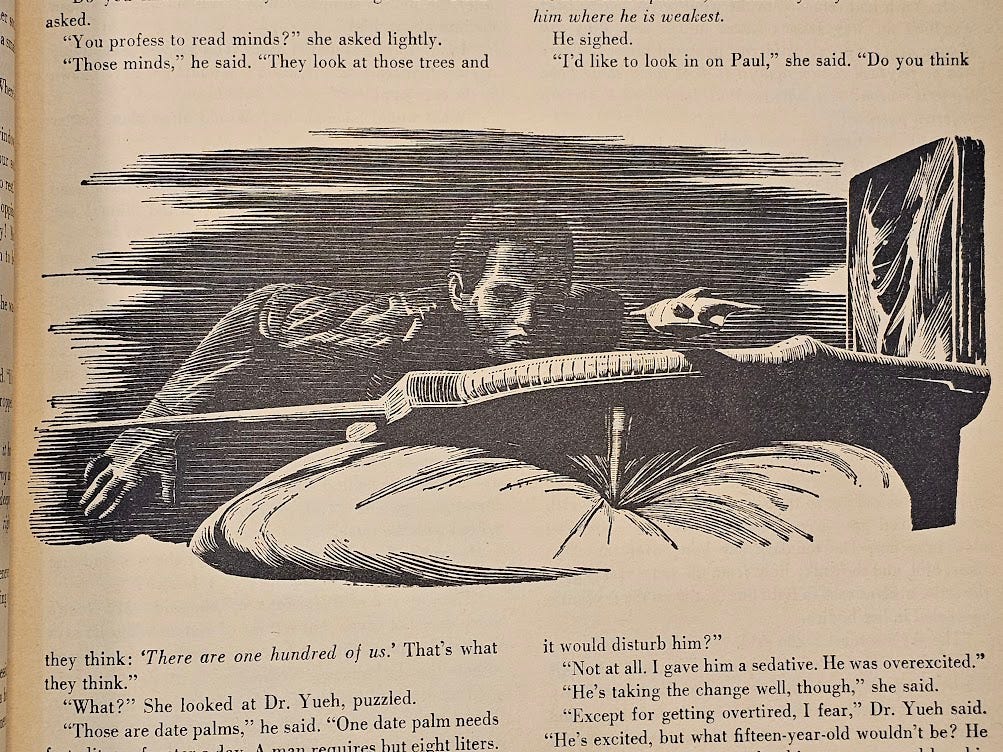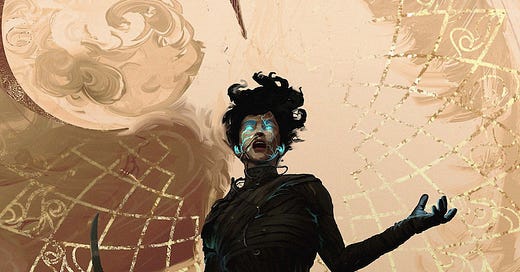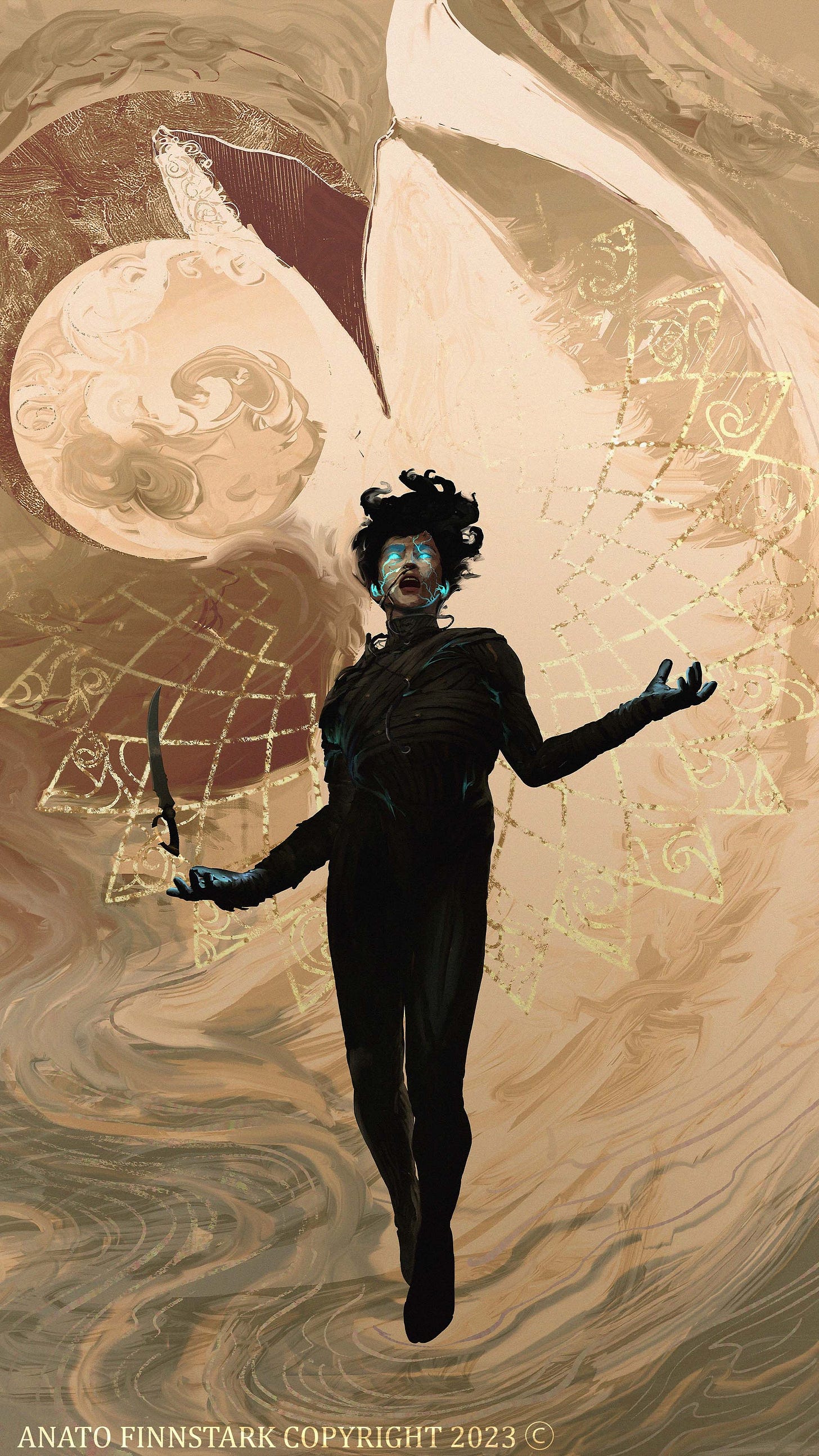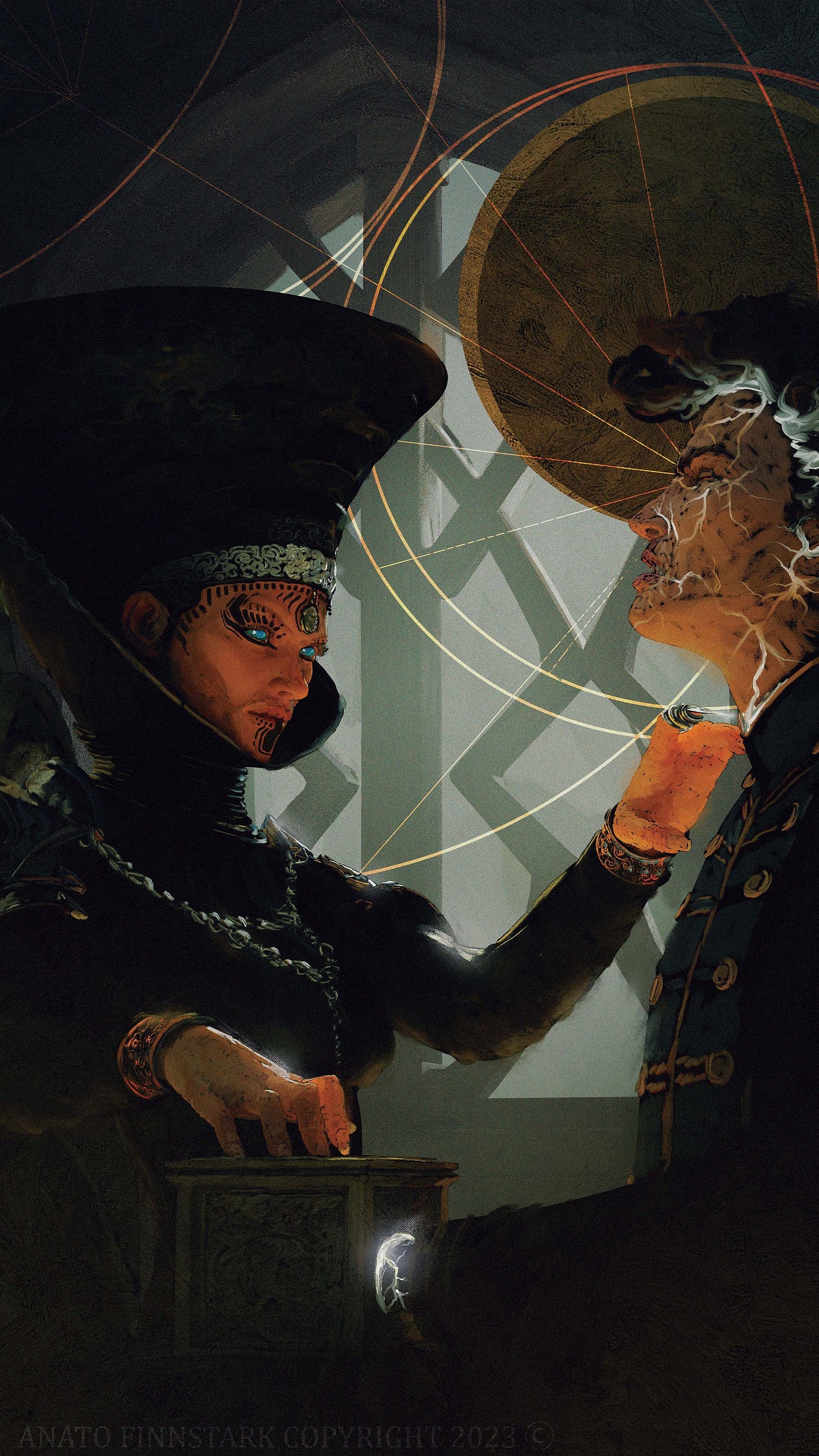Are You Human or Animal? | The Philosophy of Dune
Dune Read-Along Companion Essay 1

Welcome to the Parker’s Ponderings “Dune in June” (and some of July) Read-Along. This is the first of six companion essays that I’m writing for those reading through Dune with me. Mostly, this read-along is a great excuse for all of us to visit or revisit Frank Herbert’s magnum opus, Dune. But I will also be writing these companion pieces to help us think about some of the deep lessons and philosophical sententiae that Herbert interlaced throughout the story. I’ll try and find a main through-line to explore for each essay and then I’ll briefly cover some of the wise sayings and sub-points.
I’m looking forward to hearing from you all as well, so make sure to leave your own thoughts and favorite quotes from the sections in view down in the comments.
Here’s the reading schedule:
June 5th – pages 1-105, read until this epigraph “Over the exit of the Arrakeen landing field, crudely carved as thought with a poor instrument, there was an inscription…” and the first line of the main text: “The whole theory of warfare is calculated risk…”
June 12th – pages 106-205, stop before epigraph “There should be a science of discontent…” and the first line: Jessica awoke in the dark, feeling premonition…”
Zoom Book Club – TBD
June 19th – pages 206-305, stop before the epigraph “At the age of fifteen, he had already learned silence” and the first line: “As Paul fought the ‘thopter’s controls…”
June 26th – pages 306-407, stop before the epigraph “The concept of progress acts as a protective mechanism…” and the first line: “On his seventeenth birthday, Feyd-Rautha Harkonnen killed…”
Zoom Book Club – TBD
July 3rd 408-515, stop before the epigraph “When law and duty are one, united by religion…” and the first line: “The smuggler’s spice factory…”
July 10th – pages 516-616 (the end of the book, before appendices)
Zoom Book Club – TBD
Thanks for being here! Let’s jump in with the first major theme of the book and then I’ll touch on a couple other important themes and share some of my favorite sententiae.
The Major Theme of Reading 1: The Animal vs. the Rational Human
“Humans must never submit to animals.”
The Lady Jessica’s first lesson at Bene Gesserit school, 30.
In our first reading, Frank Herbert raises a fascinating juxtaposition between animal and human—which he then hammers again and again. I didn’t realize how key this theme was until this last read through but it’s huge. We first see the distinction broached by Paul Atreides, son of Duke Leto Atreides—‘Atreides’ probably being a reference to ‘Atreus’ of Greek mythology, father of Agamemnon, and which means “fearless” in Attic Greek, literally not fleeing from fear, not runaway, which describes Duke Leto to a tee.
Paul awakes from a dream of Arrakis, the imperial name of the planet Dune, and begins meditations to calm his concerns about having to leave his home world of Caladan for the desert planet. As he’s meditating, Paul contemplates consciousness,
“animal consciousness does not extend beyond the given moment nor into the idea that its victims may become extinct… the animal destroys and does not produce… animal pleasures remain close to sensation levels and avoid the perceptual… the human requires a background grid through which to see his universe… focused consciousness by choice, this forms your grid…” (6)
This quote is odd—it’s meant to be—but it’s integral to the plot. It’s probably the second or third most important quote of this first reading.
Herbert is commenting on ‘human uniqueness’. What sets us apart from the rest of the animal kingdom? Many philosophers and theologians have given a multitude of answers. The Bible says humans are the imago dei, the image bearers of God—they’re made in God’s image. J.R.R. Tolkien emphasized our role as ‘sub-creators’ as that which makes us unique; we are made in the image of the creator and are thus sub-creators, which emphasizes our creative will. Philosopher Charles Taylor emphasizes our ability to use language in his book The Language Animal as that which makes us distinct (Tolkien also emphasizes linguistic abilities in his Silmarillion in the discussion of the quendi and the other kinds of fëa… I think). St. Augustine and Pascal both emphasized our affections and desires to various degrees, and our ability to emulate God’s love as that which sets us apart. But many have homed in on the human intellect as that which truly sets us apart from the rest of the animal kingdom, most notably, Aristotle who defined man(kind) as the rational animal, and René Descartes, who gave perhaps the most weight to the primacy of the intellect and identified the human as the res cogitans, the thinking thing, or mental substance.
I think it’s this primacy of the intellect that Herbert has in view here as the factor which demarcates man from beast, human from animal. We find something like Plato’s tripartite anatomy of the soul, with reason as the charioteer steering the chariot and ruling over and guiding the twin horses of the appetite and the spirit. We are rational, emotional, volitional beings, but it’s our reason that sets us apart as we use it to rule ourselves well. It’s our capacity to extend our consciousness beyond the given moment; to forgo temporary pleasure; to endure physical pain; to step back from the moment and contemplate the impact of our actions; to plan for the future; to produce and not merely destroy; to perceive through a cognitive framework, a set of background beliefs, a world-and-life-view; to contemplate our universe and our role in it—this is what makes us human persons and not mere animals. We humans are animals, but we are rational animals who can focus our conscious awareness at our own discretion. We are capable of self-consciousness, self-awareness. We can transcend our instincts.
This point is brought out more explicitly at the point of Reverend Mother Helen Gaius Mohiam’s gom jabbar during Paul’s test of humanity. The Reverend Mother is a Bene Gesserit witch—bene is Latin for ‘good’, e.g., “benevolent”, but perhaps Herbert is using the Hebrew bene which means ‘sons of’ as a way of describing the Order of the Gesserits. ‘Gesserit’ is maybe a cross between Jezebel and Jesuit? As we’ll see throughout the book, Herbert likes to blend philosophies and religious ideas all together to expound his own kind of process philosophy and show how things amalgamize. He does this by imagining how a word or phrase might change in thousands of years of process.
During his test, the Reverend Mother uses “the Voice”, a kind of preternatural ability used to compel someone to obey your commands, to force Paul to come to her, to place his hand in a box which induces intense pain sensations, and not to move—which is important because she’s holding the gom jabbar at his neck, “I hold at your neck the gom jabbar,” she said. “The gom jabbar, the high-handed enemy. It’s a needle with a drop of poison on its tip. Ah-ah! Don’t pull away or you’ll feel that poison.” (9).
The Reverend Mother goes on to explain that the test of the gom jabbar sifts humans out from animals by killing only the animals. How so? Well, animals act on impulse and instinct, they react to stimuli rather than utilizing higher-order thoughts and metacognition. An animal would react to the pain and try to pull itself free on impulse. An animal would get the gom jabbar jabbed into its neck immediately for lacking control over its pain reactions. The Reverend Mother explains that pain is the test of character—which she’s right about. It’s easy to feign good character under normal circumstances, but our true character comes out under duress.
She touches his neck with her finger as a preliminary test to see if he’ll flinch in fear. Paul remains cool, passing the first test.
We’re told that Paul, like the Reverend Mother can sense truth—another preternatural ability—and so he recognizes that she’s telling the truth about his test, and he realizes he’s trapped. The only way out is through. He recites the Litany against Fear to himself, a sort of Stoic-esque mantra, to calm his nerves and achieve a sense of apatheia, that is, a state of mind in which one is not affected by the passions/suffering; freedom from the passions, achieved through self-mastery and virtue:
“I must not fear. Fear is the mind-killer. Fear is the little-death that brings total obliteration. I will face my fear. I will permit it to pass over me and through me. And when it has gone past I will turn the inner eye to see its path. Where the fear has gone there will be nothing. Only I will remain.” (10)
Paul is eventually confirmed human, after successfully enduring more pain that anyone else who’s ever taken the test. He survived the trap by exerting mind over sensation.
Later in the story, we find an analogous test to that of the gom jabbar for Paul in the form of the hunter-seeker. The Harkonnens have been forced to abandon their reign on Arrakis and to pass the planet over to the Atreides but it’s all a sham. It’s one big man trap for the Duke and the Atreides as a whole. There’s a blood feud, a vendetta, “Kanly” between the families because of Harkonnen jealousy at the Atreides familial relation to House Corrino, the imperial family, and because an Atreides dismissed a Harkonnen for cowardice way back when—think Hatfields and McCoys.
The Harkonnens leave a trap for Paul before they leave. They’ve placed an assassin in the walls of the house that the Atreides take residence in. He flies a mini drone around Paul’s room called a hunter-seeker, which has a needle nose and is meant to fly into Paul, up a nerve channel and into vital organs to kill him. Once again Paul has to achieve apatheia and remain still, lest the hunter-seeker, whose sight is based on movement, finds him. The Shadout Mapes enters Paul’s room and the hunter-seeker rockets towards her. Paul catches it and smashes its needle-nose against the wall. Once again passing the test of human by ruling over his emotions and his flight response and removing the threat to his kind, saving the Shadout Mapes.

But back to the first test. It’s during the test that we get the single most important quote of this first reading block from the Reverend Mother:
“You’ve heard of animals chewing off a leg to escape a trap? There’s an animal kind of trick. A human would remain in the trap, endure the pain, feigning death that he might kill the trapper and remove a threat to his kind.” (10)
Did you catch how massive that is? It sets up the entire story. Why does Duke Leto accept the fief of Arrakis from Emperor Shaddam IV knowing that it’s a trap orchestrated by the emperor and his mortal enemies, the Harkonnens? Because the Emperor is like the gom jabbar at Leto’s neck keeping him in the trap. The Emperor gave Arrakis over to Duke Leto to rule—Leto cannot reject the Emperors command without death or exile—which may as well be the same thing. What’s on Arrakis? The same thing that’s in the box: pain. But a human will spring the trap, feign death, remain in the trap, and seek to kill the trapper to remove the threat to his kind, his people, the Atreides.
The stress of Arrakis shows Duke Leto’s true colors: he is wise, and noble, tender, and strong. He’s a good man, a good human. Leto will not bend to the Harkonnen beasts, the animals, the chief of which is the Baron Vladimir Harkonnen—a monstrous figure, who lacks all virtue and is given over to his base desires, inverting Plato’s hierarchy of the soul and placing his appetite in the seat of charioteer. The Baron is to Duke Leto as the Bull is to the Old Duke, Leto’s Father, Paul’s grandfather, the Matador, and Leto will not submit to the animal.
Of course, there is a lesson here about the importance of mercy and forgiveness. If the two houses could let go of their pride, extend mercy and forgiveness towards one another, they could unite against the Emperor who threatens all of the great houses with his imperial Sardaukar—his elite death commandos born and bred on the hellish planet of Salusa Secundus.
Paul: the Jungian-Process-Philosophy Messiah Figure
In our first reading block, we find out that Paul very well may be the Bene Gesserit’s Kwisatz Haderach, which later we’re told means the shortening of the way and is a reference to the Hebrew term Kefitzat Haderech, which is a miraculous travel between distances—something like either teleportation or like a folding of space time.
This, to my lights, is the big what-if of Dune. Every good SF story needs a what-if that intrigues us, drives the story, and rather than telling us the future, tells us about the now, particularly about our human nature. The Bene Gesserit have been executing a meticulous breeding program for a long time, seeking to bring out latent preternatural abilities in humans, weeding out the animals, and eventually giving rise to their messiah figure, the Kwisatz Haderach, who can be many places at once. Their Reverend Mothers take a truthsayer drug to help them sense truth and to help them access Jung’s Collective Unconscious, which is something like the soul of humanity at large, as opposed to the individual unconscious which Freud emphasized. The Collective Unconscious is inherited and contains archetypes and primordial images that we use to make sense of the world and which crop up in myths.
Herbert’s ‘what-if’ is something like “what-if Jung’s Collective Unconscious were real and accessible? What would that be like? How would we access it? That, mixed with a big scoop of process philosophy, the idea that being is dynamic and not static, being is more becoming than substance ontologies allow for. Everything is in process—being is process!—so if we want to understand reality we need to start with process, with the dynamic nature of being. Herbert gives his take on process philosophy in the first law of Mentat: “A process cannot be understood by stopping it. Understanding must move with the flow of the process, must join it and flow with it.” (40). Mentats are human replacements for digital-thinking-machine-computers (AI), basically souped-up Bayesian epistemologists—super nerds who love formulas and probabilities and try to turn knowledge into mathematics.
In Herbert’s Collective Unconscious, memories of individuals are also preserved. In taking the truthsayer drug, a Reverend Mother can look down feminine avenues of the past, through the experiences and knowledge of her female ancestors back through the corridors of time. But they can only access the feminine side of the Collective Unconscious. They are searching for their male messiah who will be able to search every bit of the Collective Unconscious with his inward eye, both feminine and masculine parts—all of it.
So Paul stands a the nexus of Jungian psychology, represented by the Bene Gesserit and their Kwisatz Haderach, and process philosophy, represented by the Mentats, which Paul has been secretly trained to be since birth.
On top of potentially being the Kwisatz Hederach, Paul is also the Ducal Heir to Arrakis and Caladan, he’s a cousin to the Emperor, he has Mentat capabilities, he may have dreams of the future, he has truth sense and an instinct for rightness, which sounds like he has strong truth-tracking moral intuitions, and at 15, he’s already one of the best fighters in the imperium, able to hold his own against Gurney Halleck in training sessions. There’s more to come but I think this is all we’ve been exposed to thus far. Herbert is doing something interesting with the Hero motif and I’m excited to get your take on it when it’s even more thoroughly fleshed out.
Butlerian Jihad
The Butlerian Jihad is an homage to Samuel Butler and his novel Erewon published in 1872. Butler’s story is of a Utopia and he broaches ideas like proto-artificial intelligence, self-replicating machines, and machine consciousness. Herbert’s Butlerian Jihad was a rebellion against thinking-machines, aka artificial intelligence which culminated in the destruction of all AI and anything approaching a thinking-machine and leading to the prohibition “Thou shalt not make a machine in the likeness of a man’s mind.” This explains the need for Mentats, humans who have been trained and bred to think like a thinking-machine while remaining human.
The Reverend Mother summarizes the impetus for the Butlerian Jihad in one of my favorite quotes of the whole novel:
“Once, men turned their thinking over to machines in the hope that this would set them free. But that only permitted other men with machines to enslave them.” (14)
That’s you all! Everyone enamored with generative AI today. You who turn your thinking over to machines need to learn from Herbert before it’s too late. That way lies danger—the danger of offloading your own humanity and being a slave to AI and the tech giants who run them.
I’m running out of space here, this is getting far too long so let me rapid fire the rest!
The Personification of Virtues
Herbert tells us how he got his beloved characters, he personified different virtues. The Reverend Mother gave this lesson to Paul,
“Grave this on your memory, lad: A world is supported by four things [] the learning of the wise, the justice of the great, the prayers of the righteous, and the valor of the brave. But all of these are as nothing [] without a ruler who knows the art of ruling. Make that the science of your tradition!” (38)
Can you put names to those virtues?
On (58) Paul describes Gurney as the valorous, so he’s the brave, and he describes Duncan Idaho as the moral, so he’s the righteous. Thufir Hawat, the Mentat, is definitely the wise. And Duke Leto Atreides is the Great, due to his justice. It’s left to Paul, then, to learn the art of ruling if the world of Arrakis, Dune, is to be supported well.
Okay, well, that was a lot, but in my defense, Herbert packed a lot into this book! I don’t have space for all of my favorite sententiae but I was able to share a few. Maybe I will make a bonus post on them during the course of our read-along. If you found a particular wise saying that struck you, leave it in the comments. And let me know what you think of Dune thus far. If it’s your first time, how are you liking it? If it’s a re-read, have you picked up on anything new? What do you make of my analysis thus far? Drop it all in the comments and if you’re here on Substack, leave me a like and reshare this to help it reach more people. I’d love to pull more folks into the read-along with us!
Thanks for joining me and reading my essay. I’ll leave you with Wanna’s favorite quote from the Orange Catholic Bible:
“Think you of the fact that a deaf person cannot hear. Then, what deafness may we not all possess? What senses do we lack that we cannot see and cannot hear another world all around us?” (51)
If you enjoyed this essay, and want to say thanks with a one-time gift, you can buy me a coffee:
Or if you want to support me on a continual basis and want to join our three Zoom call book clubs were we will discuss the book live on Zoom and record it for those who can’t make it, then become a paid subscriber—that would be awesome!








Thanks for this first companion essay, and for hosting this read along! I've been wanting to read Dune for a long time, and I've had the book on my bookshelf waiting to read it, and doing the reading with these companion essays has elevated the reading experience.
That's cool to see I also had Hawat's quote about understanding a process cannot happen by stopping it, but by flowing with it.
All my other saved quotes so far come from past the first reading section so I'll post those on the next companion essay 😀
Thank you for the essay! I’ve been enjoying reading the book for the first time.
I noted most of the quotes you described but at least one more struck: “Any road followed precisely to its end leads precisely nowhere.” Isn’t it precisely true?..